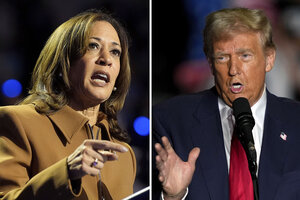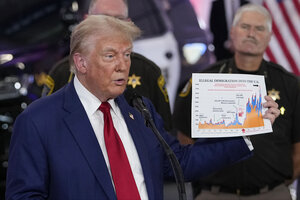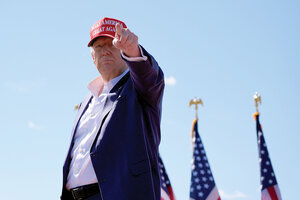Reporting on the president’s acuity: It’s harder than it looks
Loading...
“It’s clear that the best news reporters in Washington have failed in the first duty of journalism: to hold power accountable.”
That’s not a Republican lawmaker, pundit, or Fox News. It’s former New York Times Executive Editor Jill Abramson handing down a scathing indictment of the news media for allowing the Biden White House to perpetrate a “massive cover-up” of President Joe Biden’s declining abilities. “Shame on the White House press corps” for failing to pierce “the veil of secrecy surrounding the President,” she wrote on the news website Semafor.
But reporting on something like a president’s mental fitness is not as easy as it may look to outsiders – or even insiders. Legacy news outlets such as The Wall Street Journal, New York Times, and Washington Post have all chronicled Mr. Biden’s physical decline and raised concerns about his age and mental acuity – the Monitor included. But the press corps has also been fighting limited access to the president and layers of denials from the administration and surrogates that make it hard to turn personal observations and off-the-record whispers into a spear of reportable fact sharp enough to pierce that veil.
Why We Wrote This
The White House press corps has been criticized for lack of transparency around President Joe Biden’s mental faculties. But it’s a hard story to cover, given limited access and sensitivity about ageism.
“You can’t act on suspicion,” says Martha Joynt Kumar, a longtime presidential scholar who keeps detailed logs of presidential press availability. “You really want hard information.”
Press conferences: Biden 37, Trump 99
Getting that information from this White House has proved particularly difficult, reporters say. As with other presidents, much of what Mr. Biden communicates verbally is from teleprompters. But he lags far behind his predecessors in unscripted press conferences and one-on-one reporter interviews at this point in his presidency. Thursday’s press conference on the heels of the NATO summit in Washington was his 37th compared with Presidents Donald Trump (99), Barack Obama (73), George W. Bush (82), Bill Clinton (127), and George H.W. Bush (135), according to Ms. Kumar’s count.
President Ronald Reagan held fewer – 25 – but they were all solo, often lengthy appearances, while only about one-third of Mr. Biden’s have been solo. On Thursday, the president stood alone and took questions for more than 50 minutes. He made a few noticeable flubs – referring to Kamala Harris as “Vice President Trump,” just as earlier that day he called Ukrainian President Volodymyr Zelenskyy “President Putin,” before immediately correcting himself. But he also showed a strong command of foreign policy, giving in-depth, nuanced answers.
President Biden has also given far fewer interviews than other presidents, though the pressure is on to do more since his dismal June 27 debate performance. NBC’s Lester Holt will sit down with the president for an interview Monday – the first day of the Republicans’ nominating convention.
The White House points out that President Biden has had hundreds of unscripted, informal exchanges with reporters. Indeed, he tops other presidents on Ms. Kumar’s scorecard except for Mr. Trump, who, despite his railing against the media establishment, was keen to talk with reporters.
Why reporters were also “stunned” by debate
At the same time, Mr. Biden’s less formal Q&A’s are often in noisy places – with reporters shouting questions from a distance as he walks to or from his whirring helicopter or from their spot under the humming engines of Air Force One. They struggle to hear, and some replies are one-word answers.
“Reporters have been pressing for a long time for more day-to-day access – to be in the same room with the president,” says an experienced White House reporter who would only talk on background. The paucity of unscripted settings has made assessing Mr. Biden’s capabilities more difficult for the press corps, says the reporter, adding, “Most of the people I talked to were stunned by what happened on debate night.”
Members of the White House press corps point particularly to the difference between reporting on a president’s physical condition – such as Mr. Biden’s gait – and reporting on more subjective health issues, including mental fitness. Journalists witness changes incrementally, and are wary of being accused of ageism. “This is not a black-and-white question,” says another longtime White House journalist.
At the same time, “Insiders in the Biden White House have not been forthcoming with concerns about his stamina or performance,” according to the first reporter. Instead, administration officials have frequently responded to media inquiries by insisting that the president is fully engaged and on top of everything.
They dismissed independent counsel Robert Hur’s characterization of the president as a “well-meaning, elderly man with a poor memory” as a Republican hit job and as detached from reality. When asked about verbal miscues, advisers cite the president’s stuttering problem, which he struggled with as a child. “None of us have an ability to examine the president or gauge anything other than our time in front of him,” this reporter says.
FDR, JFK, Reagan, and Trump
Other White Houses have kept a wrap on the president’s health, from Franklin D. Roosevelt before his last election, to John F. Kennedy, to Ronald Reagan and the seriousness of his condition after he was shot. Although Mr. Reagan wasn’t diagnosed with Alzheimer’s until five years after he left office, a 1984 debate with Democrat Walter Mondale raised concerns about his mental health. But Mr. Reagan dispatched them in the next debate with a joke: “I will not make age an issue in this campaign. I am not going to exploit, for political purposes, my opponent’s youth and inexperience.”
That took the issue off the table – and serious media attention with it, says Kathleen Hall Jamieson, a communications expert and director of the Annenberg Public Policy Center at the University of Pennsylvania. “The press didn’t do the job it ought to have.”
Mr. Trump, by contrast, has been bombarded with questions about his fitness for office, with a waterfall of insiders leaking their concerns about his psychological state in books and articles. He boasted he aced a cognitive screening test in 2020, and his personal physician last year described his cognitive exams as “exceptional,” but did not say when they took place or what they involved.
President Biden says his daily work is a cognitive test, pointing to his policy record. Indeed, while the White House has limited media access to the president, it has made administration policy experts widely available, says Ms. Jamieson. However, she says, “When you have questions about mental acuity, then those questions cannot be addressed by looking to the success of the policies articulated by all of the members of the team.”
Liberal bias?
One charge leveled at the media is liberal bias. Reporters, the accusation goes, refrained from digging too hard into Mr. Biden’s health because of a fear that it could aid in the election of Mr. Trump – a point raised by the former Times editor, Ms. Abramson.
When asked whether liberal bias influenced the White House press corps, even subtly, against probing the president’s fitness for the job, the first reporter was adamant: absolutely not. “Being able to report on such a significant factor would be a story reporters want to pursue. And we have asked questions about his health, wellness, and age for years – and the reports we’ve been given, the comments coming from his team, have countered that.”
Frustration over the lack of information boiled over this week, causing a CBS News reporter to shout at White House press secretary Karine Jean-Pierre at Monday’s briefing for not answering questions about the president’s health and about visitor logs that showed regular visits by a neurologist to the White House. Late that night, the White House physician, Dr. Kevin O’Connor, released a statement saying the president had not seen a neurologist “outside of his annual physical,” noting that the neurologist regularly visits the White House Medical Unit in support of active-duty military members assigned to White House operations.
Despite issues related to his foot, ankle, and spine that affect his gait, the president is a “healthy, active, robust 81-year-old male, who remains fit to successfully execute the duties of the Presidency,” Dr. O’Connor wrote in his Feb. 28 annual summary this year. He has been examined by a neurologist each year of his presidency. At his NATO press conference, President Biden reiterated that doctors have not asked him to take another neurological exam but he will if they ask him to.
Aside from the annual health review, reporters have little else official to go on. The longtime White House reporter says that even when Mr. Biden ran for president in 1988, he was then a “mix” of good speeches and goofy statements. “Twenty-five years later, it was not easy to tell if a garbled statement was the same old Joe or somehow a sign of slippage from age.”
Looking back with the benefit of hindsight, the reporter says that 2023 had more instances for concern. “But reporters are always wary of getting into psychiatric reporting,” including with members of Congress, the journalist says. “It’s not something we feel particularly qualified to write.”















